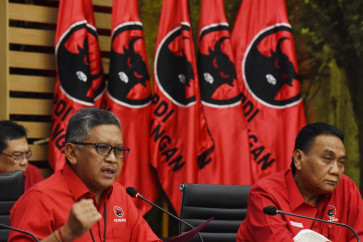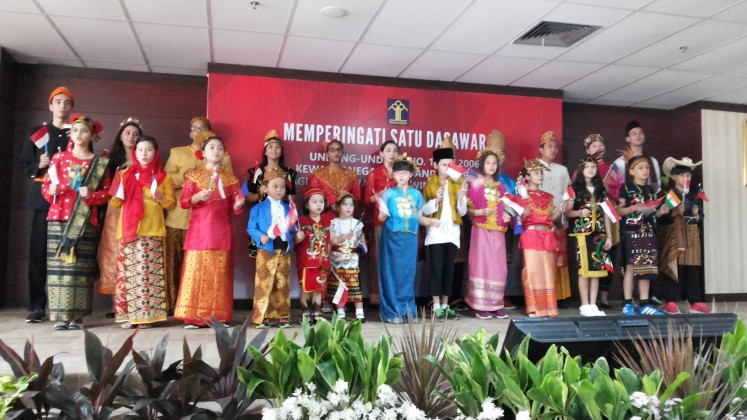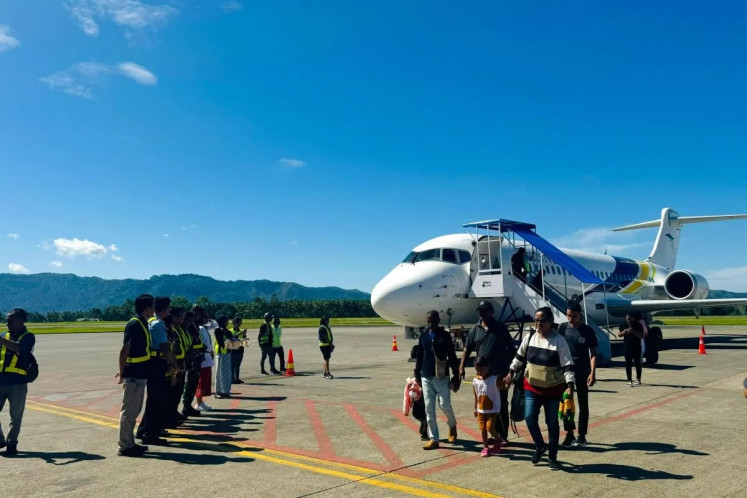Bambang Supriyanto: Saving the Heart of Java
JP/Theresia Sufa Mount Halimun Salak National Park, the "Heart of Java", is an important natural wonderland and, according to head of the park Bambang Supriyanto, a potential laboratory
Change Size

JP/Theresia Sufa
Mount Halimun Salak National Park, the "Heart of Java", is an important natural wonderland and, according to head of the park Bambang Supriyanto, a potential laboratory.
The park (TNGHS) with its plentiful rivers creates a water tower, making it an important artery for people in West Java and Banten. The mountainous forest zone is also home to endemic Java eagles (Spizaetus bartelsi) and Java gibbons (Hylobates moloch) - animals that are now endangered.
It is this very abundance of life that Bambang wishes to draw upon in his dream to "make Mount Halimun Salak National Park a natural laboratory".
"For this I'm trying to restore several damaged parts and corridors of the forest to make it a comfortable home for various wildlife species," he said.
"I hope researchers will come here to study because this park's abundant resources have never been fully revealed."
The 45-year-old from Penawangan village, in Central Java's Grobogan, gained his doctorate in land and forestry management with high distinction from the State University of Ghent, Belgium, in 1997. Before taking over at the park, he worked with the World Wildlife Fund (WWF).
"I started working with TNGHS on November 14, 2006, when my contract with WWF Indonesia was not yet over, but I considered this appointment of equal importance because it meant I would be able to directly deal with the Heart of Java," Bambang said.
"For me, my work serves as an investment that is of great benefit to all living beings."
TNGHS is Java's largest mountain national park, spanning an area of 113,357 hectares. It is the site of 117 upstream rivers, most notably the Cisadane, Cibarano and Citarik rivers, whose strong and challenging currents make them attractive for recreational rafting.
The rivers are also a source of livelihood for the communities of West Java and Banten communities - and a source of life for the rich abundance of wildlife, including the Java eagles and gibbons now on the red list of endangered species of the Convention on International Trade in Endangered Species (CITES).
Bambang's goal of turning the area into "a natural laboratory" began with the construction of an eagle sanctuary in the zone in November 2008.
"It was formerly a protected forest for production, so research on its biodiversity was limited and therefore needs to be continued," Bambang said.
"Over the past three years we have undertaken a scientific expedition along with the Indonesian Institute of Sciences, Japan International Cooperation Agency and Bandung Institute of Technology to discover Mt. Salak's diverse flora and fauna."
In managing the national park, Bambang faces three major problems. The first is the pressure of human activities in the form of illegal logging and mining, forest squatting and hunting. The area is home to nearly 100,000 people across 52 villages, most of who live below the poverty line.
The second problem is deforestation at the annual rate of around 1 percent from 1989 to 2003, particularly in former production areas.
Third is the mountain's high potential for gold and galena mining, which tempts officials in the regional administration to grant mining licenses.
To overcome these issues, Bambang has adopted a policy of commitment sharing with relevant parties, as manifested in the TNGHS Management Plan Collaboration for 2007-2026. These parties share a common vision of using the national park for the good of the people as well as protecting and conserving its natural resources while controlling the rate of deforestation.
As part of this, Bambang has developed a close relationship with the ethnic Cipta Gelar community inhabiting the mountain forest.
"We are on very good terms and in the forest management context we have a common understanding of viable forest spatial layout and rules," he said.
Among these rules is the division of the forest into separate areas where different activities are permitted.
"Some forest areas are called Leuweng titipan according to the local custom, which is the core zone where no human activities are allowed. Others are Leuweng tutupan or the jungle zone with its upstream rivers and wildlife habitat, where human activities are considerably limited," he said.
"The rest are Leuweng garapan or the traditional zone where human activity has to abide by customary rules, such as growing paddy only once a year and maintaining plantations. Any violation by residents faces the traditional punishment of kabendon or bad luck and the official discipline of legal punishment."
As head of TNGHS, Bambang is also preoccupied with executing "good park governance", the aim of which is to create a balance between the achievement of economic, environmental and social goals, and good public governance.
"I'm sure conservation will be eco-populist as it benefits all living beings. The park's management decisions have to be transparent, democratic and accountable, so that the regulations in force are observed."
To this end, Bambang has set up forums for good governance, Gede Pangrango Halimun Salak Club and the Eagle Sanctuary Club, of which he is the secretary and board chairman.
"I hope the public becomes aware about what we are doing in this park to ensure its continuity."
Java has only 17.2 percent of its forests left, while, he said, "the ideal rate is 30 percent". And that, he added, is why it is important to save this Heart of Java.









